Subscribe
"Unlock exclusive insights and elevate your financial wisdom with NetWorth.com — subscribe now to stay ahead in the wealth game!"

Finding the ideal banking partner is a critical step for any small business in California, a state renowned for its diverse industries and vibrant entrepreneurial spirit. Navigating the financial landscape requires a bank that understands the unique needs of California businesses, from startups in Silicon Valley to established enterprises in Los Angeles and beyond.
The right financial institution can provide essential tools such as business checking accounts with low fees, accessible business loans, and efficient digital banking solutions tailored to the fast-paced California market.
As we look towards 2025, this guide highlights the top banks in California that offer the best combination of services, features, and local understanding to empower your small business to thrive. We’ve carefully evaluated various factors to present you with the leading options for your consideration.
To identify the top banks in California, we evaluated several factors, including the variety of services and products each bank offers. We considered the costs associated with maintaining accounts, such as the minimum balances required to avoid these fees. We also scrutinized the banking features provided by each institution.
Further analysis included examining the fees charged for various bank services and the interest rates offered to potential customers. This comprehensive approach ensures that we recommend banks that meet diverse financial needs and offer cost-effective solutions for small businesses.








To identify the best banks for small businesses in California, we considered several critical factors that impact account opening and management. Our comprehensive analysis aimed to ensure the accuracy of our findings.
These criteria guided our selection of banks that aren’t only accommodating to the financial needs of small businesses but also supportive of their growth and operational efficiency.
To open a business bank account in California, you typically need to provide business documentation, personal identification for all owners or authorized signers, and a minimum deposit. Some banks might request extra documentation, such as proof of address or a business plan, depending on their specific requirements.
Yes, opening a bank account with an Employer Identification Number (EIN) is advisable. An EIN is necessary for tax purposes for any business with at least one employee, and banks will use this number when setting up your account. If you’re the sole employee of your business, you could use your Social Security Number (SSN). However, using an EIN instead of your SSN helps maintain a clear distinction between your personal and business finances, which is crucial for financial clarity and legal purposes.
Generally, you cannot open a business bank account in California without an Employer Identification Number (EIN). Banks typically require an EIN to open a business account. If you are a sole proprietor without employees, some banks might allow you to use your Social Security Number (SSN), but an EIN is generally preferred and often required for most business account features and for maintaining a clear separation of personal and business finances.
It’s prudent to save at least six months’ worth of operating expenses as a financial cushion in case you encounter any challenges with your business operations. This reserve allows you to sustain your business during downturns or unexpected situations. Consider adding at least 10% of your monthly profits to this savings fund to increase it, enhancing your financial security over time gradually.
For California’s small business owners, establishing a dedicated business bank account is a smart move towards streamlined financial management, stronger client connections, and seamless transactions. While Bluevine emerged as our top pick, each of the evaluated banks presents distinct advantages worth considering.
When making your selection, prioritize ease of banking, the variety of available financial products, and the level of customer service offered. Aligning these aspects with your business’s financial objectives will guide you to a banking partner that fosters both growth and stability in the dynamic California market.
>> Open a Business Bank Account With the Bluevine >>